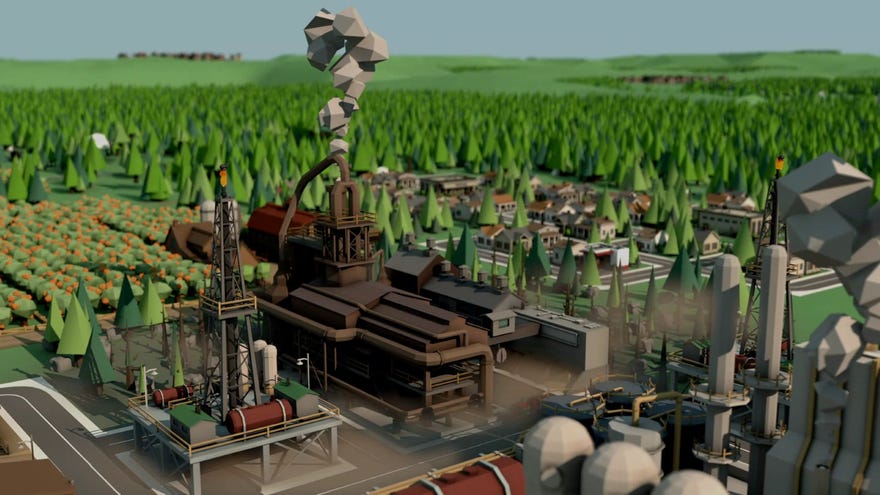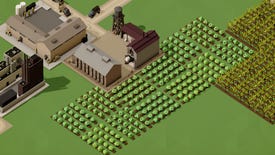Wot I Think - Rise Of Industry
Cat eggs and brute grease
I’ve spent a while trying to think my way round this, but there’s no way I can talk about Rise Of Industry without discussing its intro cinematic. Or more specifically, the voice that narrates it. “For an enterprising tycoon,” it smarms, as dawn breaks over a sleepy town swaddled in polygonal pine forest, “each new day brings new opportunities in your quest for success.”
It’s the sort of voice that belongs to someone called Chester. Chester Coinsman. Chase Brashford. Todd Winnigan. Whoever he is, he’s a VP for an American software company, selling innovative cradle-to-grave solutions to blue-chip players in the credit management sector. And this is, without a doubt, his Webinar Voice.
“Exploiting gaps in the market and meeting demand is all in a day’s work for a canny entrepreneur,” boasts Todd, over footage of little trucks pootling around folksy, tree-strewn streets. All his hard-edged business chat is counterbalanced by this cute, small-town bustle: it’s the busy world of Richard Scarry, viewed through the warm, tilt-shifted lens of Cities: Skylines. The music is borrowed from the same game - the classic ‘municipal whimsy’ suite of parping horns, meandering woodwinds and fluttering strings.

But Chester talks straight over it, chewing his way through the script like a business wasp. “Expanding your business is necessary if you are to keep up with the times,” he warns, smugly, and I can just see him with his perfectly level teeth and his faded eyes, at a breakfast meeting in an expensive yet characterless hotel. Expansion is necessary, competition is life: Chase just can’t see things any other way.

And you wouldn’t want to fuck with Brent. You see, while his voice radiates all the vocal livery of friendliness, you’d never mistake it for that of a friend. It’s as reassuring as a great white shark, cruising from the pea-green murk of a kelp forest, with a party hat perched on its cartilaginous missile-cone of a skull. Dale is out to make money, and you’ll be sorry if you forget that.
Adorable polygonal factories plop down from the sky, already burping cheery puffs of smoke from their chimneys, and Kent pipes up again. “Badly placed polluting industry will be sure to harm your reputation,” he chides, as if from behind a wagging finger, “but a well-targeted PR campaign will soon have those green towns and villages back on side and accepting your goods”.
It’s a hell of a line to unpack. There’s nothing wrong with polluting industries, Blunce is saying - just be careful to put them out of sight. And if they end up upsetting folks? Nae bother. Just chuck “PR” at the little people, until they stop caring and get back to buying tins of used brute grease, like good consumers.
“All that’s left to worry about is what you’ll be producing next,” soothes Gurk, reminding us of the correct mindset of a Business Person. And why not, eh? The towns are pretty, the fields are green, and there’s no reason to question the fundamental necessity of endless growth and consumption. We’re just giving the consumers what they want, right? And if we get rich in serving them, well shucks, I guess we earned it.
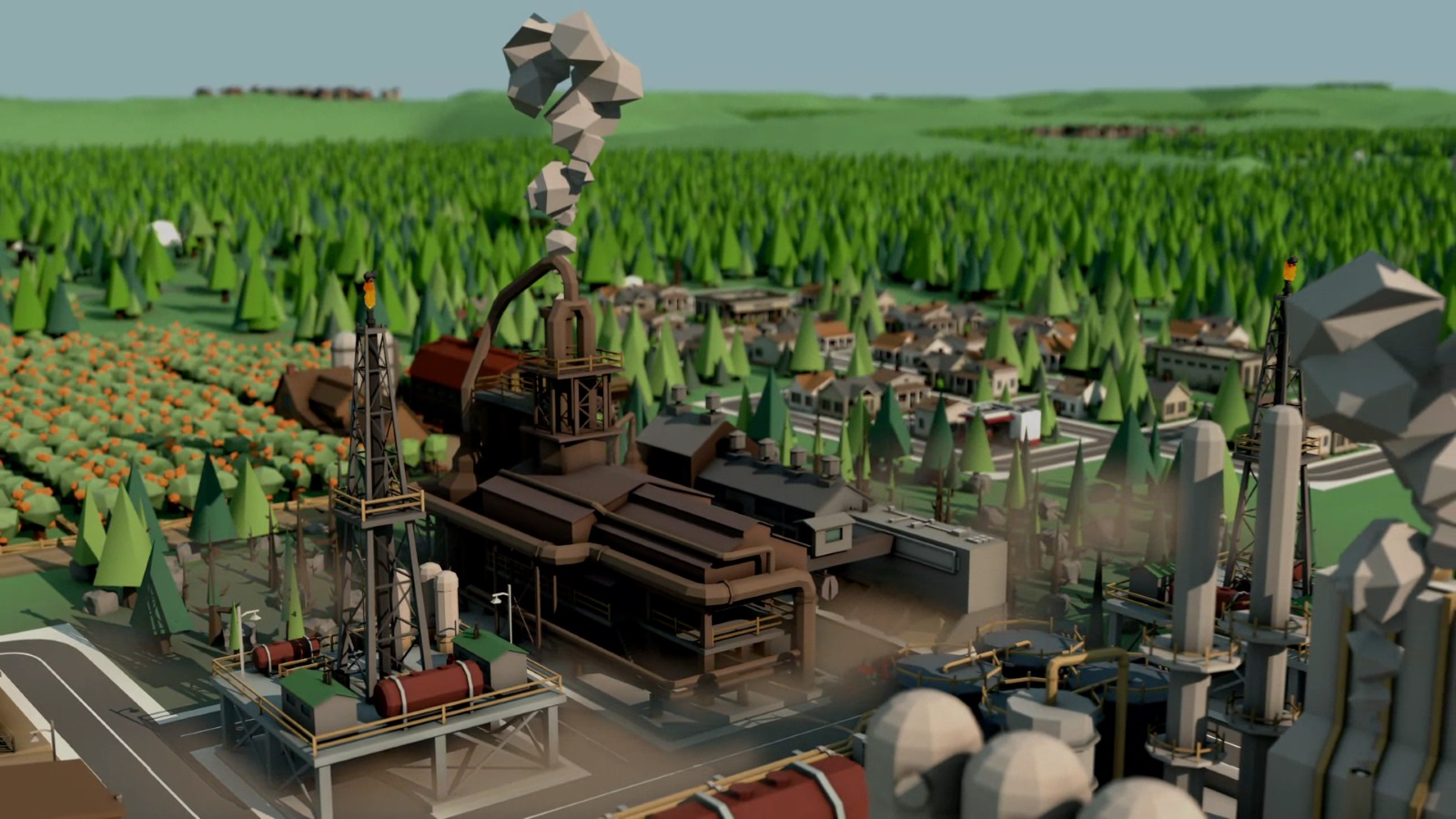
The voiceover has now reached a mild crescendo. “For you are an industrialist,” concludes Bleg, with visceral relish, “and success... is in your blood”. In your blood. Until now, I visualised this speech being given over a meticulously austere meal, by a man with a good suit and the general aura of a Ken doll owned by Dorian Grey.
But this line is something else. This is Chester in his hotel room, the night before the Big Pitch. He’s screaming the words hoarsely into a mirror, eyes watery, glowering through a mask fashioned from raw chicken skin. He’s naked, with red on him, and there might be a man dead on his balcony. You’re an industrialist, man! It’s in your fucking blood!
Alright. OK. We’re six hundred words into the review and you probably want me to start talking about the game rather than just getting increasingly weird and political. But there is a point to all this. You see, I’m not knocking whoever wrote the copy for Rise Of Industry’s intro video, or the artist behind the voiceover. Its cutthroat jargon and cutesy visuals are a perfect encapsulation of the game’s premise: ie, to simulate a fantasy world where you can enjoy the thrill of commanding capital, without anyone getting completely fucked over.
In the world of Rise Of Industry, businesses exist to fulfill the elemental force of consumer demand. The game presents you with a sprawling map populated with several cities, with visuals reminiscent of Transport Tycoon Deluxe, but with a much slicker UI. It’s your job to find out what products those cities need, then build industries on their outskirts to supply them. Where products are more complicated, you’ll be setting up multi-tiered production chains, a la Anno 1800 or Factorio, to assemble them from raw materials. And then, with your factories in place, you’ll build transport networks - everything from trucks to zeppelins - to get your finished goods to market.

That’s it! There’s no need to worry about building residential districts or supplying your facilities with a workforce, nor is there any buggering around with municipal policies, tourism, or any of the other mainstays of town building. You just make the factories, set up the transport links to take their output to towns, then use the sale proceeds to make more factories. It sure is a rise of industry.
There’s complications, for sure: as the map’s cities mature, their initial demands wane and are replaced with more complex appetites. While you might start up as a fish baron, for example, you’ll soon want to start producing more intricate goods, as it won’t be long before those pesky, heavy-browed consumers are hooting and panting for tinned food and tellies.
The game has an elegant research system that matches its pace well, unlocking new production buildings at regular intervals. It's a bit like summertime at the zoo, where they freeze a load of berries into bins full of ice for the bears to enjoy as the blocks melt. Only in this metaphor, the fruit is technology, and the bears are businessmen. What a hell of a mental image I have now.
There are a few random events and disasters to trouble you too, but they’re not particularly interesting. Mostly, they boil down to a sudden gulp of money taken from your treasury, with severity determined by difficulty setting.
And then there’s the pollution system, which is pretty much what you’d expect: “naughty” buildings like factories or coal mines spread generic blight tiles around them, and make nearby consumer populations unhappy. The solution is to either place magical anti-pollution buildings of one kind or another, or hammer the affected populations with marketing until they think it’s fine. Again, it’s fairytale capitalism: the worst thing that unconstrained growth will bring is some temporarily grubby tiles, and the destruction of the living earth can be solved with marketing.
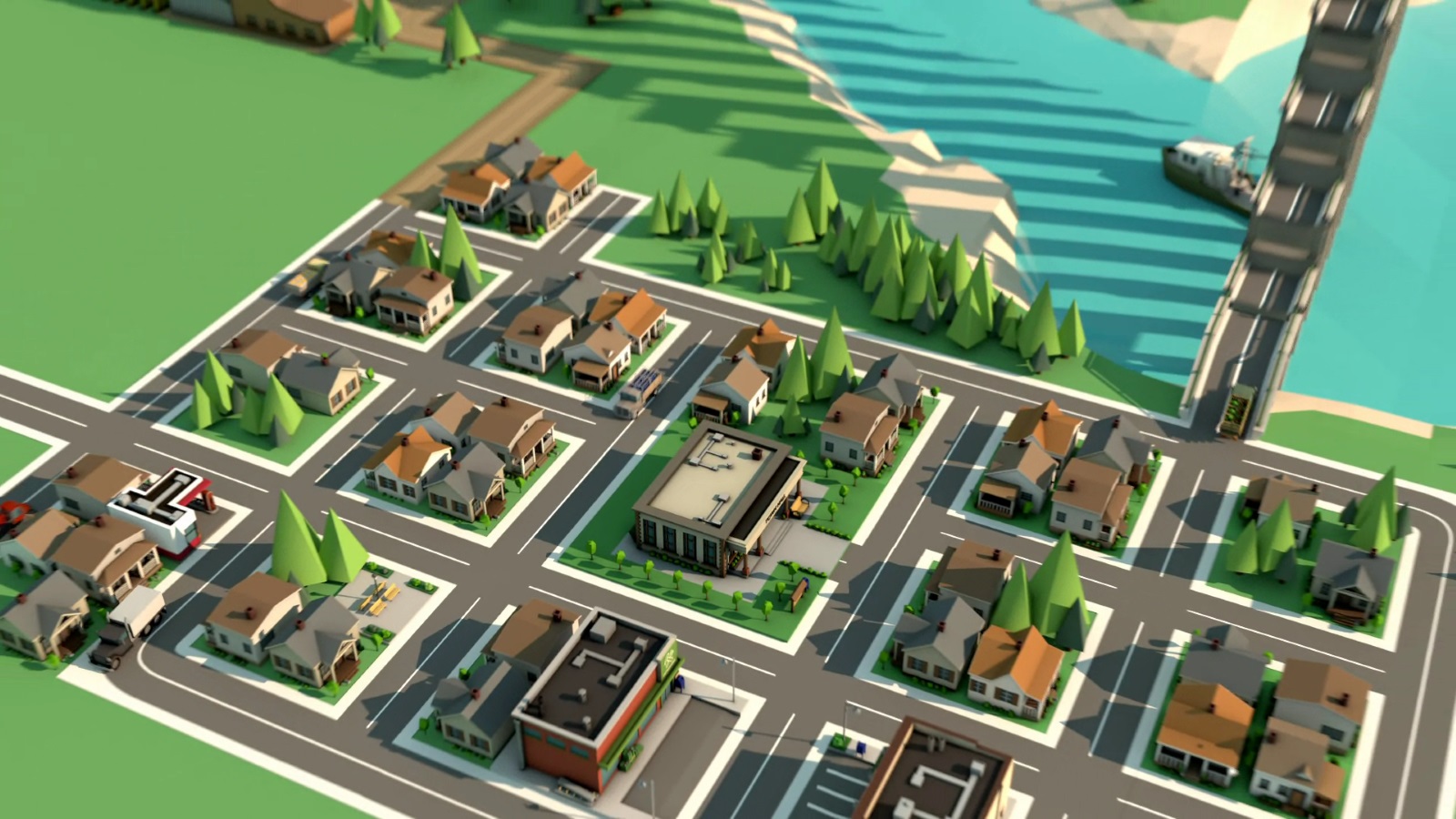
It’s a bit unfair to have a go at Rise Of Industry on an ideological basis, when this sort of ethos has been baked into management games for decades. Hell, twenty years ago, I wouldn’t have batted an eyelid at any of this. But in the present day, with an increasing number of people feeling angry and horrified at the world being held to ransom by the ambition of tycoons, it seems an odd thing to celebrate with so little nuance.
I probably still wouldn’t care, if the game was that fun. After all, I’m not the biggest fan of colonialism, but I’ve still sunk hundreds of hours into the Civilization series. Murder is completely shit, and I’ve still committed loads of it in video games. But Rise Of Industry doesn’t even turn rampant free market capitalism into that much of a guilty pleasure. It’s more like… well, a job.
There are dozens of different resources in the game, but there’s not much character to them - they might as well be the multicoloured wooden block tokens from an extraordinarily complicated Euro board game. Which is fine on its own terms, of course: I just found myself very quickly seeing through all the charming-yet-nondescript polygon art to the game of bean-counting beneath.
And when it comes down to it, this game will have you counting more beans than a Heinz auditor. A large chunk of the play time is taken up with doing finger maths (or even calculator maths) to figure out how many of each type of production building the ratios demand. You know the sort: “so five cat pits produce ten units of cat eggs every seven days, and the cat omelette factory turns three cat eggs into an omelette every nine.” Etcetera. The maths is a happy distraction, however, as there’s often not a vast amount else to do while waiting for new resource production buildings to be unlocked by research.
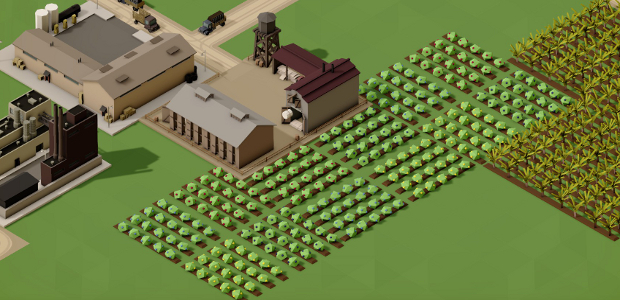
Well, that’s not true. There’s the planning of transport routes. Which is in some ways the most satisfying part of the game - truly, it’s a profound satisfaction to see your fleets of ant-like trucks carrying cat eggs and brute grease to the big city, and when trains and airships get involved it’s even more splendid.
But for all the brilliant, crisp neatness of Rise Of Industry’s UI, it often falls down when it comes to providing concise, clear information on logistics networks. Of course, it wouldn’t have to do so much heavy lifting if the game had more than the briefest, most ironbound tutorial - but it doesn’t. So you’re left with dozens of questions about core mechanics, that Industry’s labyrinth of control panels - however intuitively laid out - does little to address.
For example, the first thing you’ll do in the game is slap down a water siphon to guzzle from a lake or two, and then send it to crop farms. But will the siphon truck water directly to the farms, or do you need it to go to a warehouse first, which will then take it to the farms? If the latter is the case, will the warehouse deliver water to the farms automatically, or do you need to manually set them as destinations?
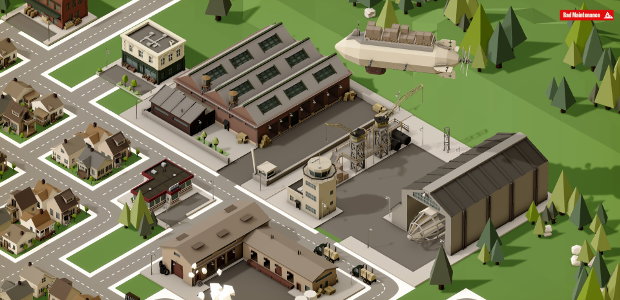
Another stumbling block, for me at least, was the truck depot. I wanted to make glass, and so needed to ship coal in from a mine on the other side of the map. The game suggested truck depots were the way to do this, but it wasn’t clear if the supply route was to be initiated from where the coal was, or at the destination. Or whether I needed the depot itself to be one end, or the other, or both.
Eventually I began picking all this stuff up by trial and error. But it detracts from the satisfaction inherent in being really efficient, when you find yourself popping down redundant warehouses all over the place because it’s the only way you can be sure to satisfy the arcane requirements of Industry.
Once you have mastered these fiddly bits, and if you find you gel with the rinse-and-repeat process of building a map-spanning mycelium of commerce, you’ll find a huge amount of theoretical replayability in Rise Of Industry. The difficulty settings are hugely customisable, offering dozens of variables to tweak, from modifiers affecting consumer demand to (gasp!) the possibility of finite resources.
I say theoretical replayability, however, as you might not get that far. In my case, I soon realised that upping the challenge would just mean making my cigarette-packet maths more and more precise in order to maintain cost efficiency, and getting to really understand the game’s transport systems… which I couldn’t really be arsed to do.
For a very slightly different type of player to me, this could be paradise, and if you even suspect you might be that sort of player, I would fully recommend you buy Rise Of Industry. If you enjoyed OpenTTD, you should probably buy the game too.
But this just wasn't for me. Ultimately, there’s only so excited I can get by the prospect of being (let’s all say it in Chod’s awed whisper) an entrepreneur. Maybe I’m just becoming more prone to escapism as I age, but there’s just not much of a thrill for me in getting really, really efficient at flogging grape juice and tables to people.
It would all be more fun, somehow, if the game leaned fully into cutthroat villainy: pure mayor-bribing, toxic-waste-dumping, asbestos-huffing bastardry. But no: if consumerism encapsulates anything, it’s the banality of evil, and Rise Of Industry represents that perfectly.

